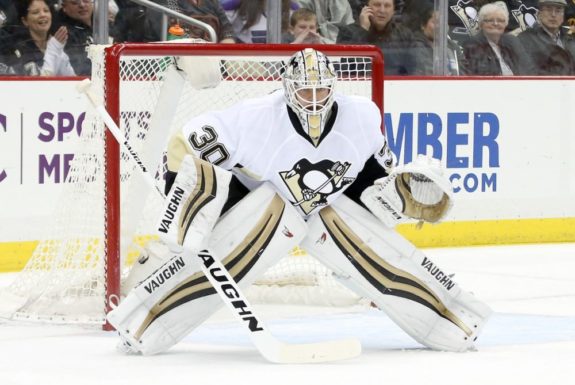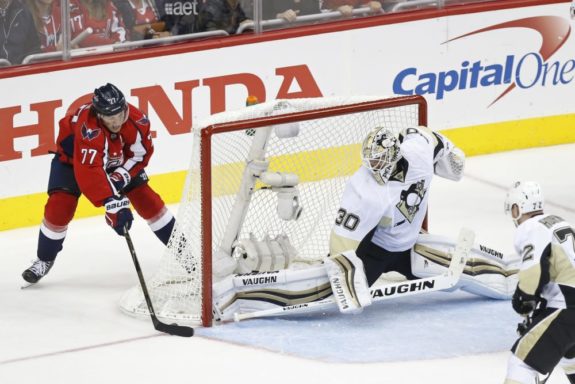The Pittsburgh Penguins’ quest for a third consecutive Stanley Cup ended in the second-round of the 2018 NHL Playoffs. The Penguins fell at home in Game 6 versus the Washington Capitals, a team they had eliminated in each of their two previous title runs. Like the old saying goes, all good things must come to an end at some point. But, for many fans, this was not the year. With all of the offensive firepower and depth from the top of their lineup to the bottom, the question remains—what went wrong for Pittsburgh?
First-Round Series and the Flyers
Pittsburgh dominated the first-round series versus the Philadelphia Flyers, defeating them in six games handily. They scored 28 goals in total and surrendered only 15. Jake Guentzel and Sidney Crosby were tied atop the leaderboard for the most points (13) after the first round across the NHL. The resurrection of the Guentzel-Crosby-Patric Hornqvist line combined for 32 total points, while other stars such as Evgeni Malkin and Phil Kessel chipped in five points each.

Pittsburgh’s penalty kill ran at an astonishing 95 percent (19/21), the best in the playoffs after the first round. The Penguins looked like they were once again the team to beat in the Eastern Conference ahead of their second-round meeting with the Capitals, but that simply was not the case.
Penguins’ Scoring Decline
In the first round versus Philadelphia, Pittsburgh averaged 4.6 goals-per-game while giving up just 2.5. The Penguins’ offensive firepower slowed in round two and their numbers dropped significantly. In the six-game series with Washington, the Penguins scored a total of 14 goals and gave up 19. In the same number of games, Pittsburgh tallied half as many goals as they did in round one while allowing the Capitals to score more in the process.

The top line of Guentzel-Crosby-Hornqvist slowed down as well. They combined for a total of 20 points, which actually is not that bad, but for their standards was a drop-off. Malkin’s lower-body injury from Game 5 of the first round carried over to Round 2, and he missed the first two games versus Washington. He scored what proved to be the game-winning goal in Game 4, but only managed three points in his four appearances. Kessel, known for his goal-scoring abilities, was nowhere to be found against the Capitals. He recorded zero goals and four assists in six games and finished with a minus-5 on-ice rating.
Special Teams
The Penguins had the eighth-best power play percentage in the NHL during the regular season, running at 22.7 percent. In the second round series versus Washington, they were actually better, running at an impressive 26 percent. Their regular season penalty-kill ran at 83.3 percent, good enough for the fourth-best in the entire league; however, against the Capitals, it ran at 73.4 percent. The problem was not their offensive efficiency on the power play; it was Pittsburgh’s inability to shut down the NHL’s second-best regular season power-play unit for six games.
For analytics purposes, one can look at this stat and realize that it works both ways. Yes, the Penguins failed to shut down Washington’s lethal PP unit, but so did the Capitals. Pittsburgh scored five goals with the man-advantage to Washington’s four. So, if special teams basically evened out, then what else could it have been?
Penguins’ Goaltending
In the 2017 Stanley Cup playoffs, Penguins goaltender Matt Murray led the entire field (minimum six games played) in both goals-against average (1.70) and save percentage (.937). Not only was he the biggest component in their second Cup run, but he saved the Penguins’ season from ending in the Eastern Conference Final against the Ottawa Senators. Murray injured his lower-body in warm-ups ahead of Game 1 of the 2017 playoffs and did not return to the ice until Marc-Andre Fleury surrendered the net mid-way through Game 3 of the Conference Final. Although the Penguins trailed 2-1 in the series, Murray helped them claw back and eventually take the series in seven games.

The 2016 playoffs were a similar tale. Murray was injured in the regular-season finale leading up to the postseason and did not play until Game 3 of the opening-round versus the New York Rangers. Once again, Murray took over the crease midway through the first round and did not look back. He posted a 2.08 goals-against average (GAA) and a .923 save percentage (SV%) en route to Pittsburgh’s first Stanley Cup since 2009.
In the first five games of this year’s second round against the Capitals, Murray had a .899 SV % and a 2.80 GAA. In Games 3 through 5 combined, he had allowed nine goals and had a .879 SV% average. Murray’s first-round totals are a far different story as he had a .911 SV% along with a 2.66 GAA against the Flyers. Although his first-round numbers were increasingly superior, they do not seemingly come close to his previous two postseasons in which Pittsburgh hoisted the Stanley Cup.
Murray’s 2017-18 Struggles
One problem that has plagued Murray’s ability to consistently stay between the pipes in his three-year NHL career is injuries. He has failed to stay healthy in every season, and his games have been limited due to this issue. The 23-year-old has sustained one upper-body wound, three lower-body injuries, a fractured hand and a concussion. From 2015 to 2018, Murray has recorded the most injuries by any goalie in the NHL and has only played in 49 games during the regular season in each of the past two years.

To add to a long list of an injury-ridden past, Murray has had to deal with something that few players in today’s game have had to endure—the death of his father, Jim. He took an indefinite leave of absence in late December and missed three starts in that span. To make matters worse, Murray suffered a concussion in late February in which he missed three weeks of action to deal with headache-like symptoms.
In the 2017-18 regular season, Murray generated a .907 SV% and a 2.92 GAA in 49 games played. To put these numbers into perspective, in the previous two regular seasons combined he had a .926 SV% and a 2.20 GAA.
Murray’s struggles this season can be contributed many psychological effects that stem from the inability to stay healthy combined with the death of his father. Nobody knows what he is dealing with mentally, but one can assume that his injuries are catching up to him at such a young age and they are hindering his in-game confidence levels. This aspect led to a lackluster regular season that has crept into his postseason play and can be attributed to him not being able to get into a consistent rhythm all year long.
Game 6 Failure
The Penguins were undefeated in elimination games (4-0) in head coach Mike Sullivan’s three seasons behind the bench. In 2016, they were in the same position in the Eastern Conference Final against the Tampa Bay Lightning, trailing 3-2 in the series, and went on to win the next two games en route to Sullivan’s first Cup. This time around, the Penguins could not keep the streak alive, falling 2-1 in overtime of Game 6.
In the 2018 playoffs, Pittsburgh did not take advantage of its home crowd like they have in years past. In six home games this postseason, the Penguins won just two of those contests. Pittsburgh needed a quick start in Game 6 but failed to capitalize on its early chances. Once again, Murray surrendered a goal early in the second period that he will look back on during the entire offseason break. However, this game was not his fault and was his arguably his best game of the series.

The biggest difference was that the Penguins’ stars could not connect on any of their chances, and then Crosby coughed up the puck in the neutral zone that led to a series-clinching overtime goal by Washington’s Evgeny Kuznetsov. Without Nicklas Backstrom in the lineup for the Capitals due to an upper-body injury, the Penguins blew a huge opportunity to lengthen their season another day and force a third historic Crosby-Ovechkin Game 7.
A season that seemed destined for a coveted three-peat after a strong finish to the regular season and a dominating first-round series performance came to a crashing end in Game 6 of the second round. Now, the Penguins enter the 2018 NHL offseason looking for answers instead of hosting a Stanley Cup parade for the third consecutive summer.